Key takeaways:
- Healthy eating involves embracing a variety of whole, natural foods, focusing on enjoyment and nourishment rather than strict calorie counting.
- Maintaining energy balance is essential; incorporating a mix of macronutrients and eating smaller, frequent meals can lead to sustained energy levels.
- Key nutrients for energy include complex carbohydrates, protein, and healthy fats, all of which contribute to longer-lasting satiety and vitality.
- Hydration is crucial; consistent water intake can significantly boost energy and cognitive function throughout the day.

Healthy eating defined
Healthy eating, to me, feels like crafting a vibrant plate that reflects both nourishment and joy. It’s not just about counting calories or eliminating certain foods; it’s about embracing a variety of whole, natural foods that fuel my body and satisfy my cravings. For instance, I love loading my meals with colorful fruits and vegetables—each bite bursts with flavors that remind me how important it is to enjoy what I eat.
When I think of healthy eating, I also consider how it impacts my mood and energy levels. I remember a time when I relied heavily on processed snacks, thinking they were convenient, but they left me feeling sluggish and irritable more often than not. Have you ever noticed how a wholesome meal can drastically shift your mindset? For me, swapping those snacks for nuts or a piece of fruit taught me the powerful connection between food and well-being.
Ultimately, healthy eating means listening to my body and giving it what it craves while making balanced choices. I’ve learned that indulging in nutrient-rich foods can be both satisfying and energizing. How about you—what foods make you feel alive? For me, it’s those hearty grains and a splash of olive oil that bring an extra kick to my day. It’s pretty remarkable how a little mindfulness in our eating choices can lead to significant improvements in our overall health and happiness.
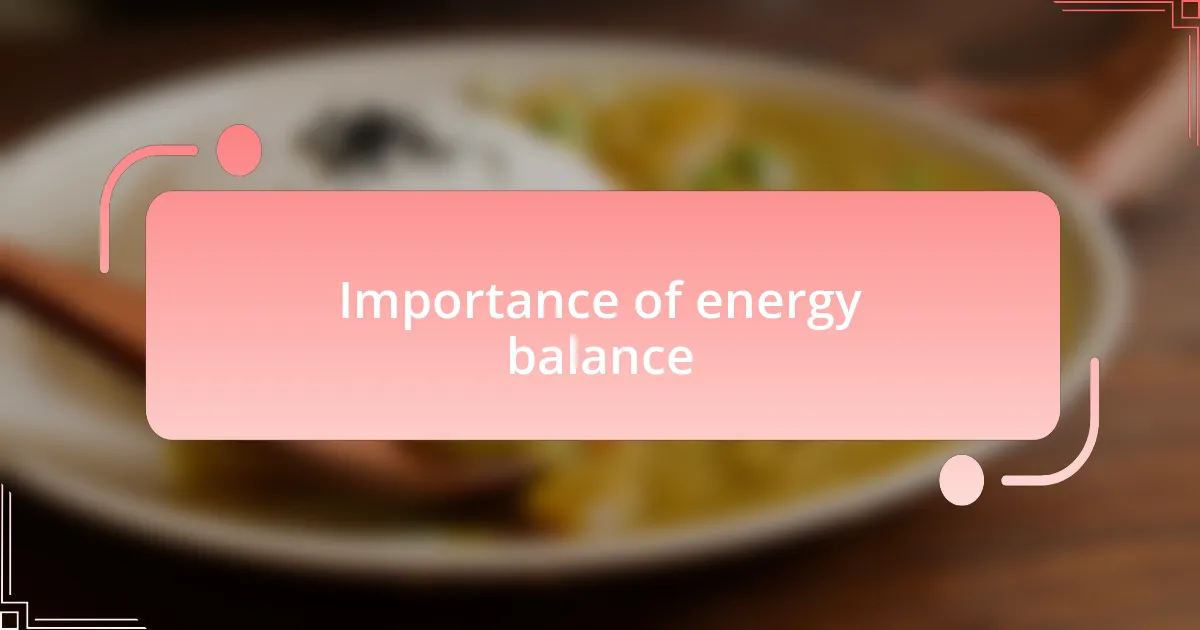
Importance of energy balance
Energy balance is crucial for maintaining both physical and mental well-being. I’ve experienced firsthand how my energy levels fluctuate depending on what I consume. On days when I prioritize balanced meals—like grilled chicken with quinoa and vegetables—I find that my productivity soars. Have you ever felt that burst of energy after eating a wholesome meal? It’s that sense of vitality that keeps us going.
When we ignore energy balance, it’s easy to let unhealthy habits sneak in. I recall a week when I gravitated toward sugary snacks to keep me awake during long work hours. While those treats offered a quick fix, the inevitable crash left me feeling exhausted and unmotivated. It really struck me how vital it is to keep a steady influx of nutrients to keep my energy sustained throughout the day.
Finding the right energy balance isn’t solely about what I consume; it’s also about how I approach meals. I now strive for a mix of macronutrients—proteins, fats, and carbohydrates—because that blend supports sustained energy. Have you tried varying your meals to include all three? It’s been eye-opening to understand that when I pay attention to this balance, not only do I feel more energized, but I also enjoy my food more fully.
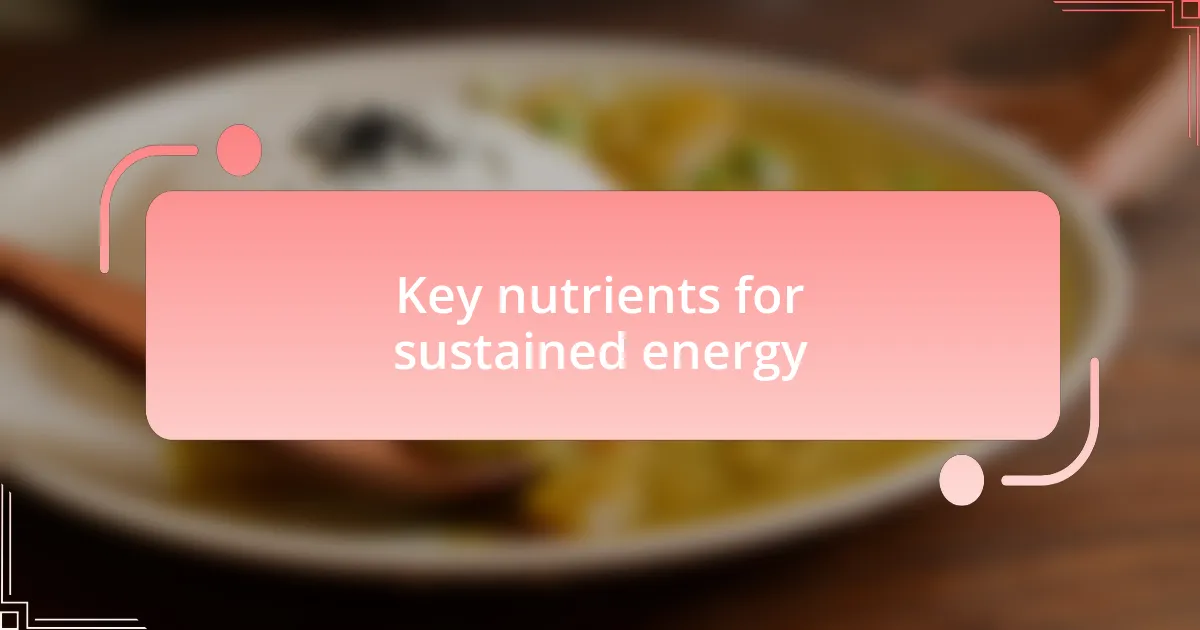
Key nutrients for sustained energy
When it comes to sustained energy, I’ve found that complex carbohydrates are my best friend. Foods like whole grains, fruits, and vegetables provide a steady release of energy, unlike simple sugars that offer fleeting bursts. For instance, switching from white rice to brown rice in my meals has made a significant difference; I feel more energized and ready to tackle my afternoon tasks without that dreaded slump.
Another key nutrient I rely on is protein. I’ve noticed that incorporating sources like beans, nuts, and lean meats keeps me feeling satisfied longer. I still remember a particularly grueling work week when I opted for protein-rich snacks, and to my surprise, my energy levels remained stable throughout the day. Have you ever tried reaching for a handful of almonds instead of chips? Just that small change can have a profound impact on how energized you feel.
Finally, don’t underestimate healthy fats—they play a crucial role in my energy management. Foods like avocados and olive oil not only make my meals more delicious but also contribute to lasting satiety. I’ve often found that adding a drizzle of olive oil to my salads leaves me feeling content and energized for hours. Have you explored the power of healthy fats? Embracing these nutrients has transformed my approach to eating and significantly boosted my overall energy levels.
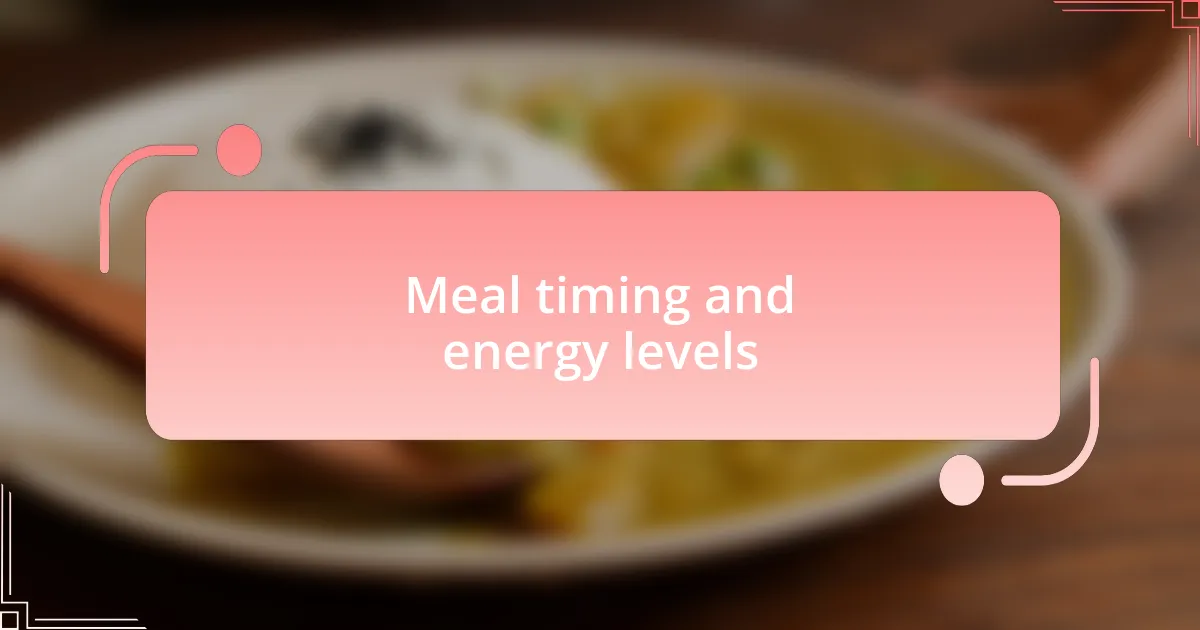
Meal timing and energy levels
Meal timing plays a pivotal role in how energized I feel throughout the day. I’ve discovered that eating smaller, more frequent meals rather than the traditional three large ones keeps my energy levels stable. For instance, during a recent busy week, I tried having a light snack every couple of hours—like a piece of fruit or a handful of nuts—and I was amazed at how it helped me avoid that post-lunch slump that usually drags me down.
I’ve also noticed that my energy peaks and dips coincide with my meal schedules. For example, I’ve found that my best work happens right after a satisfying breakfast. On days when I skip or delay breakfast, I often struggle with focus and motivation. When did you last notice how your performance was affected by what and when you ate?
Exploring the timing of my meals has truly changed my daily rhythm. I’ve started eating dinner earlier, allowing my body to digest before bedtime, which surprisingly enhances my sleep quality. It’s incredible how a simple adjustment like this can have a ripple effect on my energy levels the following day. What changes have you considered making in your meal timing to boost your own energy?
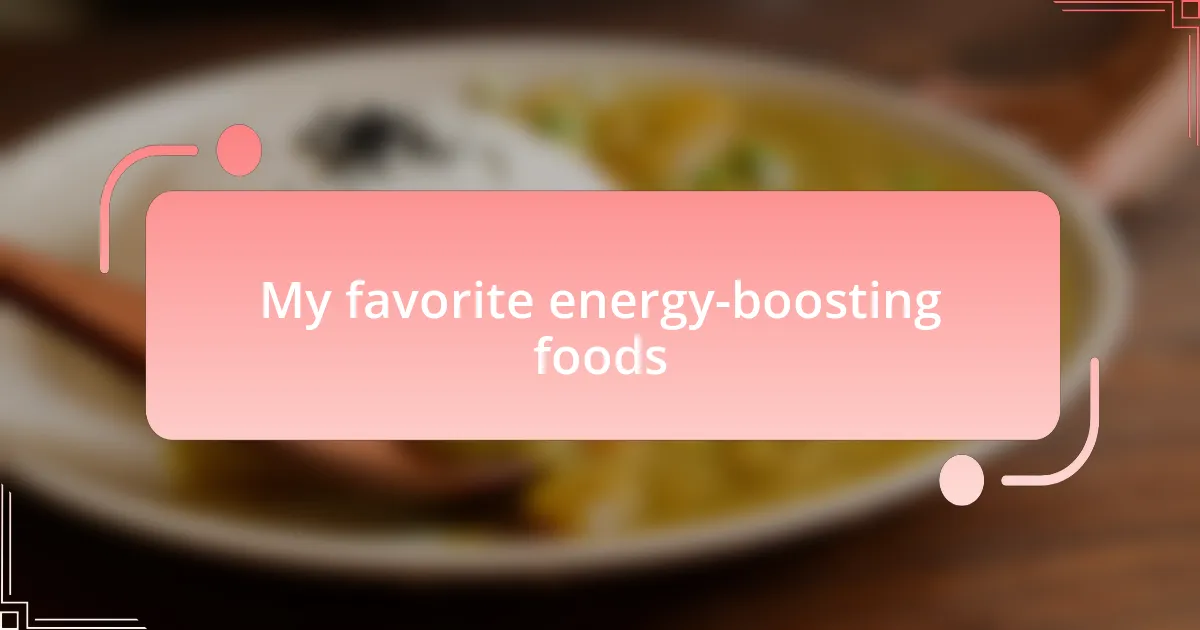
My favorite energy-boosting foods
I have a special place in my heart for bananas when it comes to energy-boosting foods. They are not only delicious but also packed with potassium, which helps maintain muscle function. On days filled with intense workouts, I often grab one before I head to the gym. It’s amazing how one simple snack can provide that quick energy boost I need without the crash that comes from sugary options.
Another favorite of mine is quinoa. This whole grain is a great source of protein and fiber, keeping me feeling full and energized longer. I remember making a quinoa salad for lunch one day, loaded with veggies and a splash of lemon. Not only did it taste fantastic, but I also felt alert and ready to tackle my afternoon tasks without hitting that dreaded wall of fatigue.
Lastly, I can’t forget my love for dark chocolate. Just a small piece can elevate my mood and energy levels. I discovered this at a friend’s birthday party when I indulged in some rich chocolate cake. Instead of feeling sluggish afterward, I felt pleasantly energized, which made me wonder: how often do we overlook the little pleasures that can provide a boost? Sometimes, it’s those small, enjoyable foods that make a big difference in how we feel.
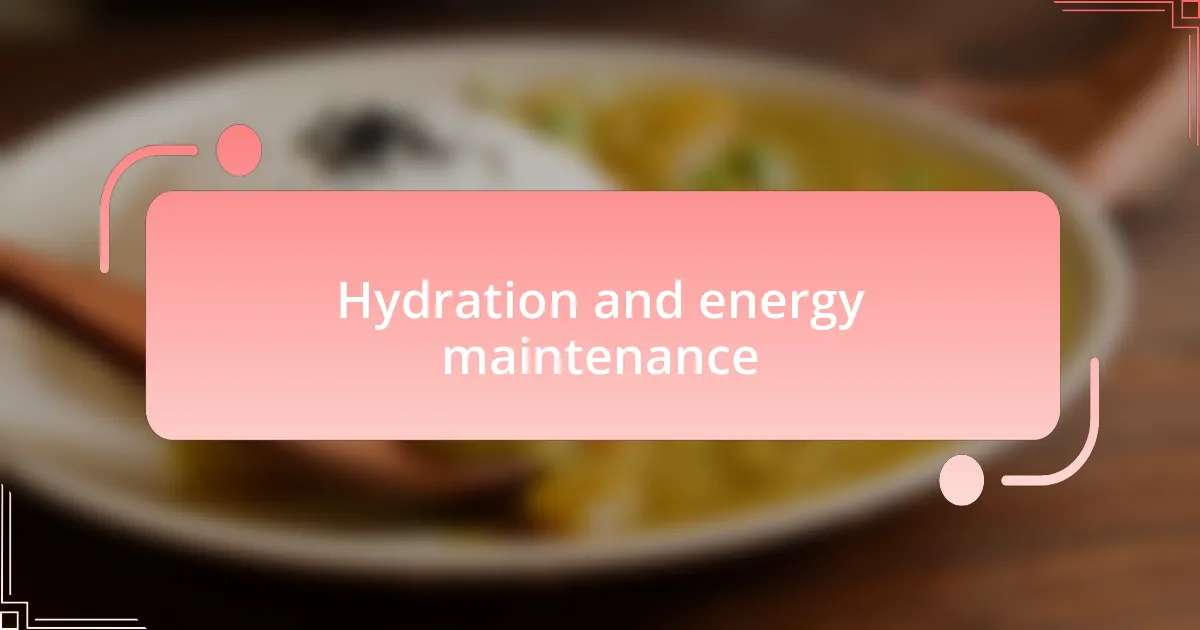
Hydration and energy maintenance
Staying hydrated is essential for maintaining my energy levels throughout the day. I’ve noticed that when I underestimate my water intake, even mild dehydration can leave me feeling sluggish and unfocused. It’s surprising how a simple glass of water can perk me up, almost like a light switch turning on, allowing me to tackle tasks with newfound vigor.
During moments of fatigue, I often reach for something refreshing—herbal teas have become my go-to. I remember one particularly draining afternoon when I brewed a pot of peppermint tea. The invigorating aroma alone lifted my spirits, and with each sip, I felt the fatigue melt away. It’s fascinating how hydration doesn’t just quench thirst; it also revitalizes the mind and body.
I often ask myself: am I drinking enough to fuel my energy? In my experience, the secret lies in consistency rather than just chugging water when I feel parched. I’ve started carrying a reusable water bottle, and now, I’ve made it a habit to sip periodically throughout the day. This simple shift has profoundly impacted my productivity and overall well-being, turning hydration into one of my key strategies for sustaining energy.
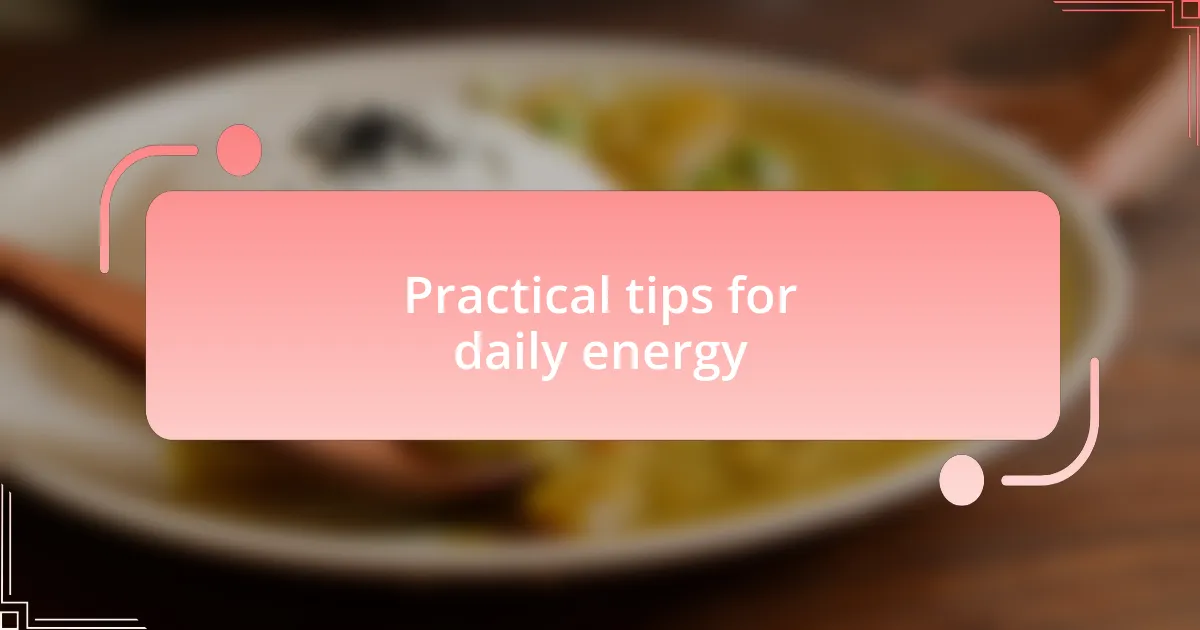
Practical tips for daily energy
To keep my energy levels stable, I’ve learned the power of regular, balanced meals. I remember a time when I would skip breakfast, thinking it would save time, but I quickly found myself in a mid-morning slump. Now, I prioritize a hearty breakfast with a mix of protein, healthy fats, and whole grains. It fuels me up and sets the tone for the day, making me feel like I’m ready to tackle my goals.
Incorporating small snacks between meals has also been a game-changer for maintaining energy. I often reach for a handful of nuts or some fresh fruit, especially when I feel that familiar dip in energy. These wholesome snacks not only keep my body energized but also allow me to indulge in different flavors and textures. Have you ever noticed how satisfying a crisp apple can be in the afternoon? It’s like a refreshing reboot for my brain and body.
One of my more recent discoveries is the importance of movement. I used to sit for long hours while working, and I often felt drained. Now, I integrate short breaks for stretching or a brisk walk, even if just for five minutes. Moving around revives my mind and prevents that sluggish feeling from creeping in. Isn’t it amazing how just a few moments of activity can shift your energy levels? For me, these little changes have made all the difference.